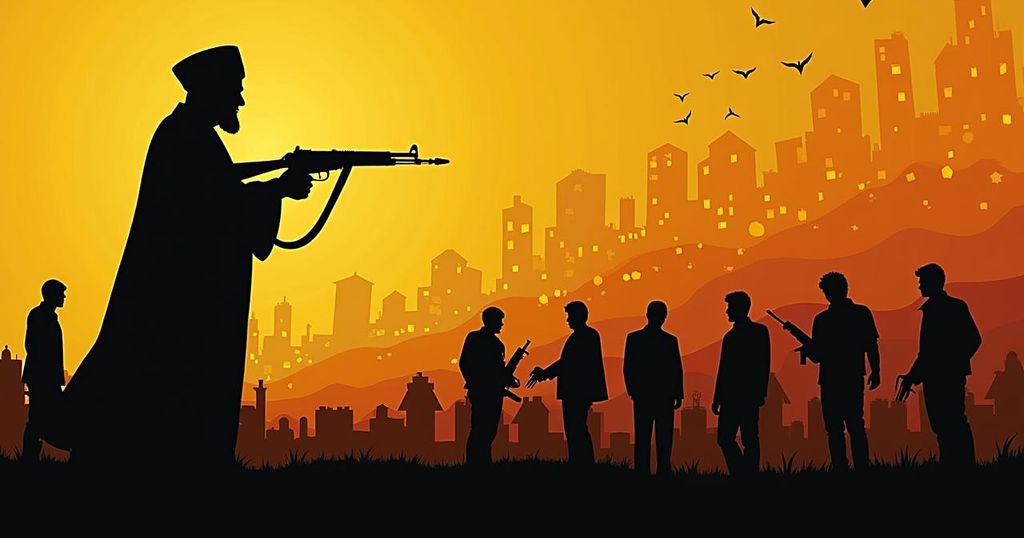Hezbollah and Iran at a Crossroads Following Hassan Nasrallah’s Assassination
The assassination of Hassan Nasrallah has left Hezbollah leaderless and struggling to maintain order as Israeli strikes continue. This event signals a critical juncture for Hezbollah and Iran, who must decide on a response—either retaliate or withdraw. With Hezbollah’s infrastructure damaged and public sentiment against violence growing, the Middle East stands at a crossroads, with potential ramifications extending beyond Lebanon.
The assassination of Hassan Nasrallah, the long-standing leader of Hezbollah, marks a pivotal moment in the ongoing conflict involving Israel and has profound implications for the Middle East. Nasrallah’s death, resulting from Israeli airstrikes in southern Beirut, has left Hezbollah in a state of disarray, lacking clear leadership amid escalating violence. Over the last eighteen years, Nasrallah cultivated Hezbollah, transforming it into a formidable military force with extensive resources and infrastructure, aided significantly by Iran. His role transcended that of a mere military leader; he became a symbol of resistance against Israel on a global scale. However, the Israeli military had been gathering intelligence about Nasrallah over the years and executed a successful strike that not only eliminated him but also potentially several senior figures within Hezbollah. This steep loss has created a critical juncture for Iran and Hezbollah, who must now deliberate whether to retaliate against Israel or to retreat and reassess their strategies. Analysts believe that missile strikes targeting key Israeli cities, such as Tel Aviv, are a likely immediate response, albeit challenging due to the significant degradation of Hezbollah’s command structure in light of recent Israeli operations. Nasrallah’s death may enable a power struggle or lead to the emergence of a new, potentially more formidable leader, echoing historical precedents in the region. While the physical arsenal of Hezbollah remains intact, the organization’s reputation is severely compromised, especially among Lebanese citizens who are weary of continued violence. There exists an opportunity for moderate factions within Lebanon to assert themselves amidst this turmoil. Iran, having relied heavily on Nasrallah’s leadership, may weigh its options carefully. On one hand, Iran could aggressively empower its proxy forces to retaliate; on the other hand, there may be a strategic pullback to preserve what remains of Hezbollah for future conflicts. Israel now faces its own set of strategic choices—whether to capitalize on this moment by instigating a ground invasion in Lebanon or maintain its current air campaign. While the calls for a ground offensive may intensify, it entails significant risks, given the continued presence of Hezbollah fighters who are now entrenched and potentially mobilizing within Lebanon’s complex tunnel systems. The ramifications of Nasrallah’s assassination could be felt not only in Lebanon but also in Gaza, where Hamas leader Yahya Sinwar may find his position similarly threatened with the potential loss of unity among resistance groups. Overall, the recent upheavals serve as a reminder that the Middle East’s intricate conflicts require not only military strategy but also diplomatically calculated engagements to avoid broader escalation.
The situation in the Middle East is notably volatile, largely characterized by the ongoing tensions between Israel and groups like Hezbollah and Hamas. Hassan Nasrallah has been a critical figure in this landscape, symbolizing resistance to Israeli military actions and serving as the leader of Hezbollah since the early ’90s. His leadership coincided with pivotal moments in Lebanon’s history, as well as significant shifts in geopolitical alliances involving Iran. Recently, the conflict has escalated, with Israeli forces increasing strikes on Hezbollah positions after an alleged attack by the group in solidarity with Hamas. This escalation culminated in the targeting of Nasrallah himself, bringing forth concerns about Hezbollah’s future and its relationship with Tehran.
In summary, the assassination of Hassan Nasrallah presents a turning point for Hezbollah, Iran, and Israel, reshaping the geopolitical dynamics within the region. Hezbollah faces immense challenges in leadership and public support while grappling with the implications of Nasrallah’s absence. Meanwhile, Iran must make critical decisions that could either provoke further conflict or usher in a phase of reevaluation. Israel, emboldened by its recent military successes, must consider its next steps carefully to avoid exacerbating a situation that remains highly unstable.
Original Source: news.sky.com




Post Comment